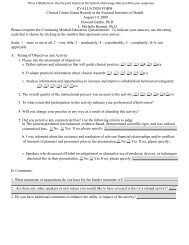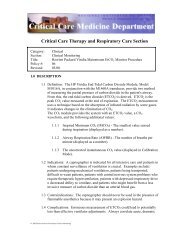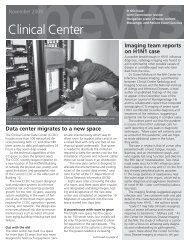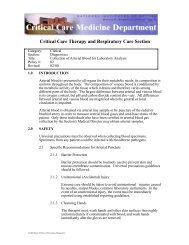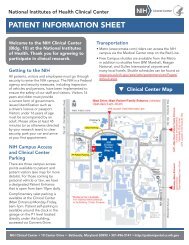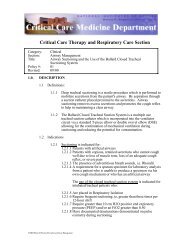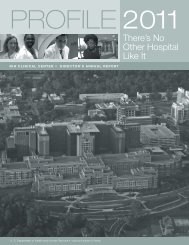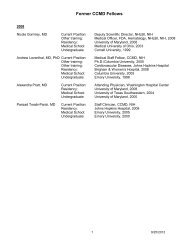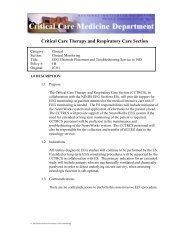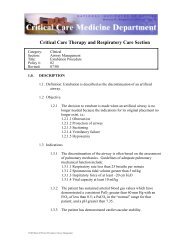Patient Handbook - NIH Clinical Center - National Institutes of Health
Patient Handbook - NIH Clinical Center - National Institutes of Health
Patient Handbook - NIH Clinical Center - National Institutes of Health
Create successful ePaper yourself
Turn your PDF publications into a flip-book with our unique Google optimized e-Paper software.
10 <strong>Patient</strong> <strong>Handbook</strong><br />
S E C T I O N T W O<br />
n To provide your own transportation to and from<br />
the <strong>Clinical</strong> <strong>Center</strong> and to pay living expenses<br />
except when all or part <strong>of</strong> these expenses are<br />
covered by the protocol or authorized by the<br />
responsible <strong>NIH</strong> physician; to advise accompanying<br />
escorts or others who travel to and remain<br />
in the Bethesda area that they must pay for their<br />
travel and living expenses except when designated<br />
by <strong>NIH</strong> as a guardian for you when your<br />
expenses are covered;<br />
n To provide complete information, so that<br />
contacts and communications to schedule visits<br />
and monitor health status can be maintained.<br />
This information should include: (1) your current<br />
address and phone number; (2) the names,<br />
addresses, and phone numbers <strong>of</strong> next <strong>of</strong> kin or<br />
persons to be notified in the event <strong>of</strong> an emergency;<br />
and (3) the names, addresses, and phone<br />
numbers <strong>of</strong> physicians responsible for your ongoing<br />
care, including your family physician and<br />
the physician(s) who referred you to the <strong>NIH</strong>;<br />
n To return to the care <strong>of</strong> your own health-care<br />
provider when participation in the protocol is<br />
completed or stopped and your medical condition<br />
permits.<br />
If you have questions about your rights, you may<br />
contact the <strong>Clinical</strong> <strong>Center</strong> <strong>Patient</strong> Representative<br />
at 301-496-2626.<br />
ADVANCE DIRECTIVES<br />
FOR MEDICAL CARE<br />
The rights <strong>of</strong> <strong>Clinical</strong> <strong>Center</strong> patients to participate<br />
in decisions concerning their medical<br />
care are preserved even if they lose the ability to<br />
communicate directly with their caregivers. One<br />
method <strong>of</strong> exercising these rights is to prepare an<br />
“advance directive.”<br />
An advance directive is a document in which a<br />
person gives advance directions about medical<br />
care or designates who should make medical decisions<br />
for that person if he or she loses the ability<br />
to make such decisions. There are two types <strong>of</strong><br />
advance directives: treatment directives, the most<br />
common example being the living will, and proxy<br />
directives, the most common example being the<br />
durable power <strong>of</strong> attorney for health care.<br />
A treatment directive, such as a living will, is a<br />
written statement expressing the forms <strong>of</strong> medical<br />
treatment a person wishes to receive or forego<br />
when unable to make decisions in stated medical<br />
conditions. Such medical conditions may include<br />
irreversible unconsciousness, terminal illness, or<br />
severe and irreversible brain disease.<br />
A proxy directive, such as durable power <strong>of</strong><br />
attorney, is a person’s written statement naming<br />
another to make medical decisions for that<br />
person if he or she becomes unable to make such<br />
decisions. In 1990, Congress approved legislation<br />
called the <strong>Patient</strong> Self-Determination Act.<br />
This law requires all medical facilities reimbursed<br />
by Medicaid and Medicare to educate<br />
patients about advance directives and to help<br />
them make advance directives if they choose to<br />
do so. Although the <strong>Clinical</strong> <strong>Center</strong> does not<br />
receive such financial reimbursement, there has<br />
been, and continues to be, a commitment to<br />
consistent and thoughtful attention to the ethical<br />
aspects <strong>of</strong> patient care, including advance<br />
directives. The <strong>Clinical</strong> <strong>Center</strong> has guidelines<br />
for using durable power <strong>of</strong> attorney for patients<br />
in certain research studies.<br />
If you have any questions about advance directives,<br />
please speak with your doctor, your nurse,




